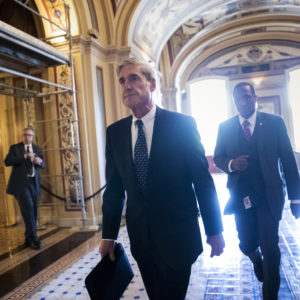It’s difficult for President Donald Trump to so much as sneeze without a political opponent crying foul. Political memories are short, but the environment wasn’t much different for President Barack Obama. We simply don’t trust each other to do what’s right—especially if it’s politically costly. In the era of bitter partisanship, who watches America’s watchmen?
The short answer is—at least as it pertains to the president and high-level executive branch officials—that the Department of Justice investigates and prosecutes federal crimes. When there’s a conflict of interest for the attorney general and the attorney general recuses him or herself, the acting attorney general takes charge. That’s precisely what happened when Attorney General Jeff Sessions recused himself from the investigation into the 2016 presidential campaign.
Under certain circumstances, a special or independent counsel is necessary to maintain the integrity of an investigation or prosecution. Federal regulation articulates grounds for appointing a special counsel. The attorney general or acting attorney general must determine (1) that a criminal investigation is warranted, (2) that investigation or prosecution by the Department of Justice would create a conflict of interest or other “extraordinary circumstances,” and (3) that it’s in the public interest to appoint a special counsel. Those were the regulations that led Deputy Attorney General Rod Rosenstein to appoint counsel Robert Mueller.
The fly in the ointment is that the attorney general and other politically appointed officials at the Department of Justice have at least some perceived loyalty to the president who appointed them. While it’s certainly possible that each would act independently in the interest of justice, it’s also fair to raise concerns about conflicts of interest. For example, President Trump was clearly upset with Sessions’ decision to recuse himself from investigations into the 2016 presidential campaign. The clear reason for Trump’s displeasure was that Sessions ceded control over the independent counsel.
We haven’t always selected independent counsels in the manner we currently do. The Ethics in Government Act (EGA) of 1978, a response to the Watergate scandal that took down President Richard Nixon’s administration, created a different process for appointing independent counsels.
The EGA required the attorney general to investigate allegations of federal crimes by the president, vice president and other specified executive branch officials. The law provided 90 days for the attorney general to decide if the allegations had merit. If they did, a specially appointed three-judge panel selected an independent counsel and defined his or her legal jurisdiction. The independent counsel could only be removed by congressional impeachment and conviction or by the attorney general for certain specified reasons.
In spite of the fact that the provisions of the EGA prevented the president from unilaterally firing a special counsel, the Supreme Court held in Morrison v. Olson (1988) that the EGA did “not violate the separation of powers principle by impermissibly interfering with the functions of the Executive Branch.”
After numerous special counsel appointments during the Clinton administration, Congress allowed the special counsel provisions of the EGA to lapse in 1999.
Critics of the EGA’s special counsel provisions, including Justice Antonin Scalia, feared that the independent counsels would interfere the functioning of the executive branch and allow such counsels to advance their personal political agendas.
Admittedly, the EGA’s independent counsel provisions weren’t perfect, but they attempted to address perceived conflicts of interest within the highest levels of the executive branch. Each time Congress reauthorized the independent counsel provisions within the EGA, they had an opportunity to improve it..
Public confidence in government is every bit as important as our laws and regulations. Right now, that confidence is at historic lows. According to Pew Research Center, “[o]nly 18% of Americans today say they can trust the government in Washington to do what is right ‘just about always’ (3%) or ‘most of the time’ (15%).”
We need clear answers about who watches our watchmen that appear far less susceptible to partisan allegiances than our current system. As Robert Mueller continues to investigate Russian involvement in the 2016 presidential campaign, Congress must consider options to increase public confidence that even those who occupy the highest levels of government aren’t above the law. Renewing and improving the EGA’s lapsed independent counsel provisions might be a great place to begin.

